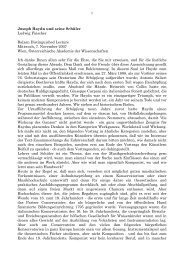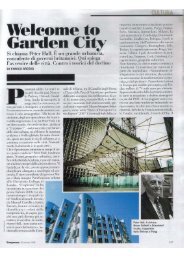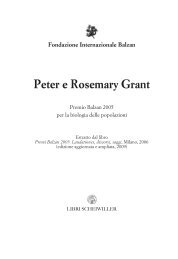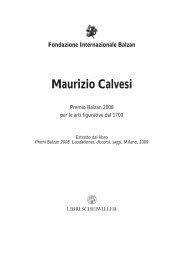International Balzan Foundation Luigi Luca Cavalli
International Balzan Foundation Luigi Luca Cavalli
International Balzan Foundation Luigi Luca Cavalli
You also want an ePaper? Increase the reach of your titles
YUMPU automatically turns print PDFs into web optimized ePapers that Google loves.
<strong>Luigi</strong> <strong>Luca</strong> <strong>Cavalli</strong>-Sforza<br />
consumption, especially among adults, which came about through a Lamarckian<br />
type of heredity (of acquired characteristics during lifetime). The genetic study of<br />
human evolution has shown with extreme clarity that the genetic success of a<br />
population, as proved by its expansion in numbers and across vast regions, was<br />
largely the result of major technological innovations in relatively recent times:<br />
food production (agriculture, stockbreeding and their various developments) or<br />
transportation (cattle, horses, camels, lamas, boats, oceanic navigation), or military<br />
power (bronze, iron, cattle and horses, camels) and, in more recent times,<br />
communication (roads, and again the horse, the telephone, radio, television, and<br />
so on), mathematics (agronomy, geography, astronomy, computers), the experimental<br />
method (engineering, chemistry, modern physics).<br />
With the modern triumph of communication cultural evolution is becoming<br />
more and more the directional force of human evolution, and genetic evolution<br />
may well end up be completely under its control. Even the evolution of animals<br />
and plants is undergoing intense acceleration as a result of cultural evolution in<br />
humans. The remote origins of the success of humans as a species lie in two innovations<br />
which are partly biological, but perhaps in part also cultural. The first<br />
is language, which certainly required a strong development of the essential<br />
parts of our brain, and which was hence largely a biological evolution. However,<br />
once it became possible to use it, it developed enormous driving force. The<br />
other was human ingeniousness, which brought about many cultural innovations,<br />
the usefulness – if not necessity – of which has been proved beyond a<br />
doubt. Unlike genetic innovations due to mutation, which are by chance, cultural<br />
innovations are responses to a necessity. However, they are not always<br />
wholly appropriate, and like all innovations, they may also have costs that are<br />
heavier than their benefits.<br />
Racism<br />
I do not like the word “race” because it corresponds to old subdivisions that are<br />
inconsistent with genetic reality and unjustifiable by a rational classification.<br />
Moreover, there is no real use for such classifications and, what is worse, there<br />
is always an associated racist flavor. Darwin had already recognized the difficulty<br />
of a rational classification of races in what is an almost perfect continuum, and<br />
noted the enormous variety of numbers and definitions of races, from two to almost<br />
one hundred. The current trend toward increased admixture can only<br />
make the idea of race even less clear.<br />
17















